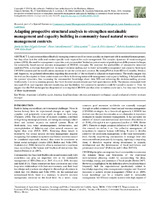Adapting prospective structural analysis to strengthen sustainable management and capacity building in community-based natural resource management contexts
Autor
Delgado Serrano, María del Mar
Vanwildemeersch, Pieter
London, Silvia
Ortiz-Guerrero, Cesar E.
Escalante Semerena, Roberto I.
Rojas, Mara
Editor
Resilience AllianceFecha
2016Materia
ArgentinaColombia
Latin America
Local knowledge
Mexico
Participatory techniques
Social-ecological systems
Strategic foresight
METS:
Mostrar el registro METSPREMIS:
Mostrar el registro PREMISMetadatos
Mostrar el registro completo del ítemResumen
ABSTRACT. Local communities collectively managing common pool resources can play an important role in sustainable management,
but they often lack the skills and context-specific tools required for such management. The complex dynamics of social-ecological
systems (SES), the need for management capacities, and communities’ limited empowerment and participation skills present challenges
for community-based natural resource management (CBNRM) strategies. We analyzed the applicability of prospective structural
analysis (PSA), a strategic foresight tool, to support decision making and to foster sustainable management and capacity building in
CBNRM contexts and the modifications necessary to use the tool in such contexts. By testing PSA in three SES in Colombia, Mexico,
and Argentina, we gathered information regarding the potential of this tool and its adaptation requirements. The results suggest that
the tool can be adapted to these contexts and contribute to fostering sustainable management and capacity building. It helped identify
the systems’ dynamics, thus increasing the communities’ knowledge about their SES and informing the decision-making process.
Additionally, it drove a learning process that both fostered empowerment and built participation skills. The process demanded both
time and effort, and required external monitoring and facilitation, but community members could be trained to master it. Thus, we
suggest that the PSA technique has the potential to strengthen CBNRM and that other initiatives could use it, but they must be aware
of these requirements.

